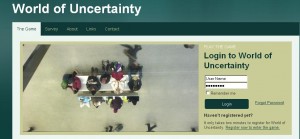 Supported by the Engineering and Physical Sciences Research Council (EPSRC), a team at Queen’s University Belfast is exploring whether people can be trained to make better decisions by improving their ability to recognize and make allowances for their subjective opinions and biases. This interdisciplinary project harnesses leading-edge expertise in mathematics, statistics, critical thinking, knowledge management and educational psychology. The team has developed a prototype that could be built on by commercial games manufacturers and turned into an e-learning or training tool for professionals and for the general public. Here is how the researchers describe the “World of Uncertainty” game:
Supported by the Engineering and Physical Sciences Research Council (EPSRC), a team at Queen’s University Belfast is exploring whether people can be trained to make better decisions by improving their ability to recognize and make allowances for their subjective opinions and biases. This interdisciplinary project harnesses leading-edge expertise in mathematics, statistics, critical thinking, knowledge management and educational psychology. The team has developed a prototype that could be built on by commercial games manufacturers and turned into an e-learning or training tool for professionals and for the general public. Here is how the researchers describe the “World of Uncertainty” game:
“The game uses multiple choice questions on a variety of subjects. However this is not just an ordinary quiz. Its main purpose is to improve and calibrate players’ certainty and sense of probabilities rather than subject knowledge. Thus the topic of the quiz or difficulty level became irrelevant so long as the player enjoys the quiz and is motivated to achieve higher score. On answering each question, the player has to indicate his/her confidence as accurately as possible using interactive slider. As a player adjusts the slider, corresponding payoffs for correct and incorrect outcomes will be shown. This payoff function designed to encourage the honest and accurate confidence judgment. In addition to immediate feedback, players can access results of all completed quizzes and calibration charts from personal profiles. Detailed feedback helps to correct over/under confidence in quantifying internal probabilities.”
Over 500 members of the general public, as well as many students from Queen’s and Dundalk Institute of Technology, have already tried out the prototype. The prototype game allows you to increase your accuracy in answering questions and train to quantify your confidence. It is available for anyone to try out at http://quiz.worldofuncertainty.org/.

Leave A Comment
You must be logged in to post a comment.